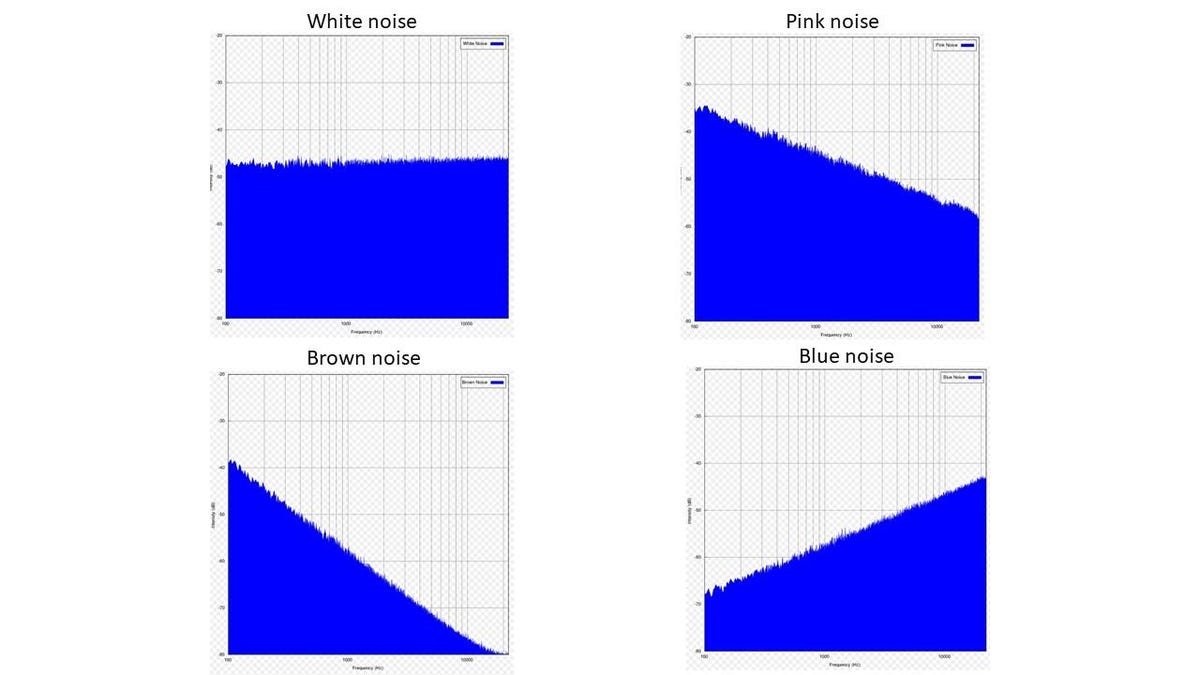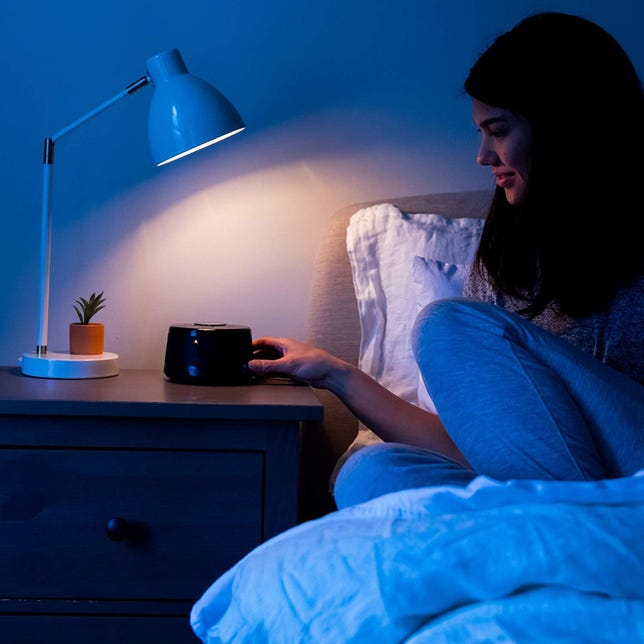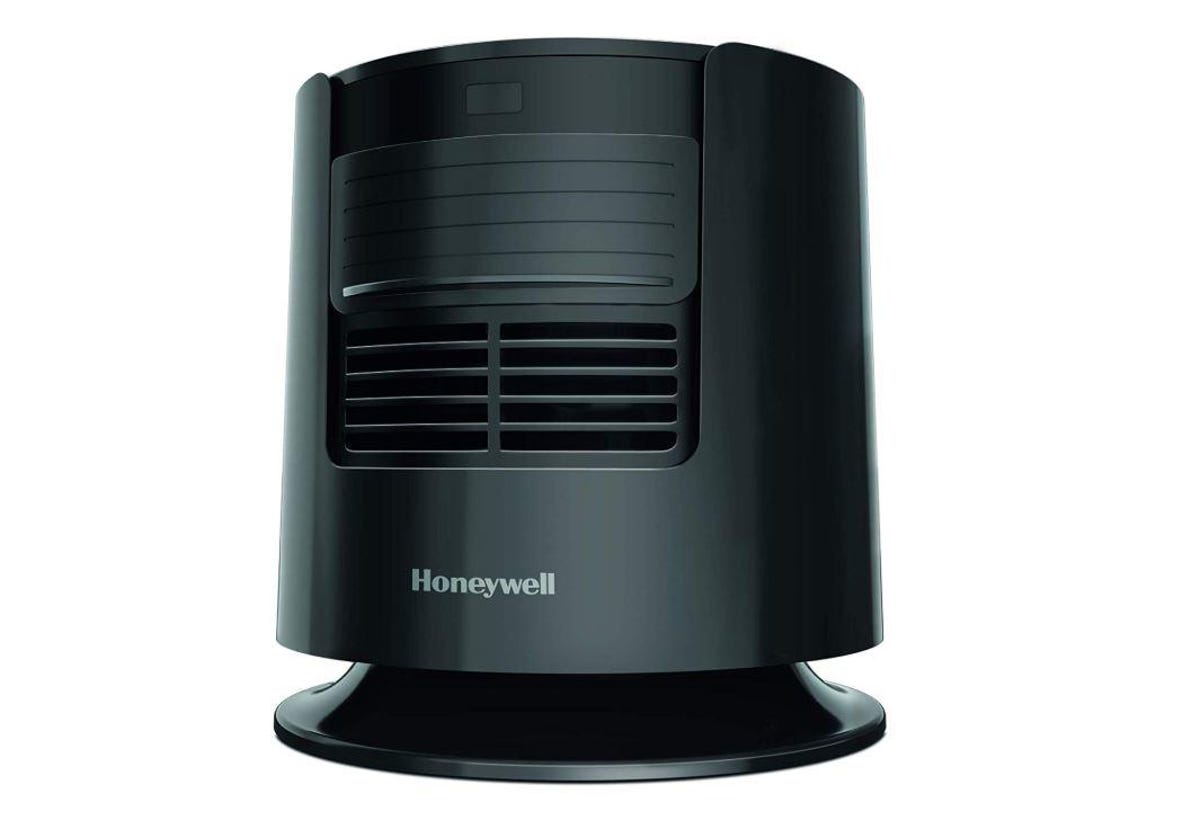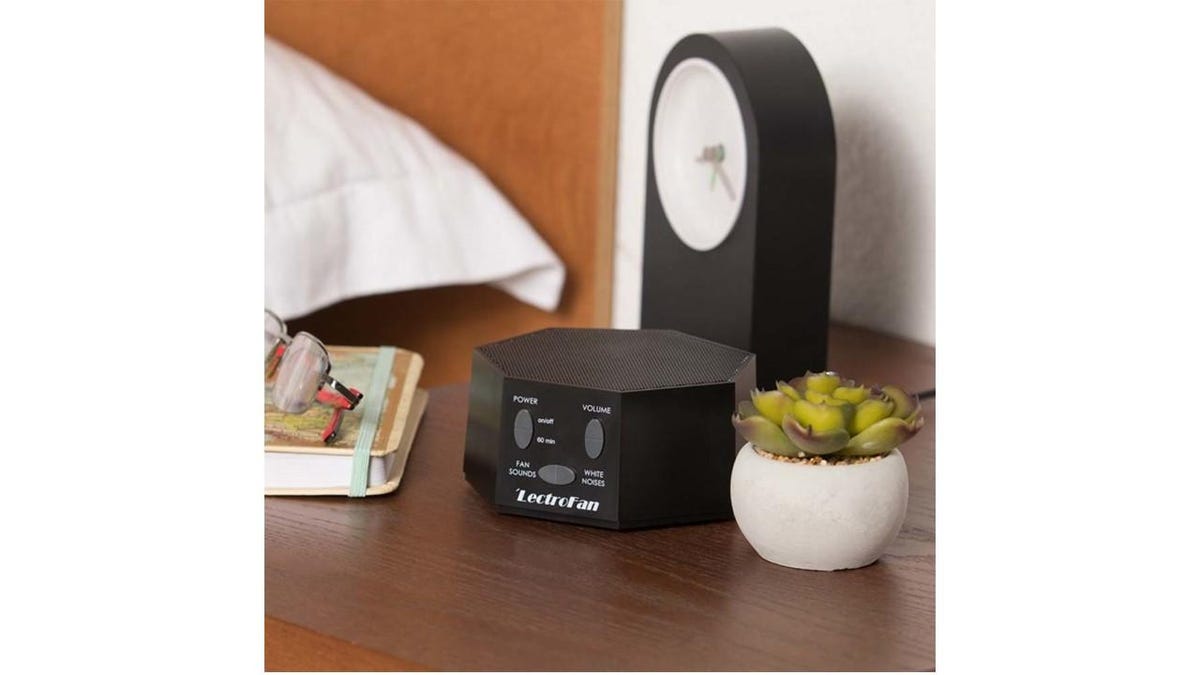[ad_1]
If you live in a city or have family members who keep you awake, you probably have a love-hate relationship with noises at night. Loud changes in sound are jarring and can interrupt your sleep. Noise machines can generate a steady color noise that helps block out these unwanted sounds.
You’re probably thinking of white noise right about now. White noise is the best known, and machines that make it have been on the market for decades. But that’s not the only noise that can help you sleep. Let’s dig into the types of noise, what they sound like and which one is the best for sleep.
What’s a sound wave, anyway?

All the different “colors” of noise resonate with different amplitudes at different frequencies. They can all help you sleep, but it’s worth experimenting with the different sounds.
Wikipedia
OK, let’s dig in to a bit of science. You can deconstruct sound waves into two components:
- Frequency, which refers to how quickly the wave vibrates per second and is measured in Hertz (distant memories of high school science coming back yet?). One Hertz means one vibration per second.
- Amplitude, also called power, which refers to the size of the waves. This is usually measured in decibels, a measure of the volume or intensity of sound.
All the different colors of sound vibrate at different frequencies, and their names are loosely analogous to the colors of light. For example, white noise emits all of the frequencies audible to human ears, just like white light contains all of the colors of light visible to the human eye.
Don’t confuse the colors of sound with ambient noise, which refers to the background noise present in any given setting; for instance, the rumble of a train mixed with passenger chatter, or the rustle of leaves in the wind mixed with the chirping of birds.
The colors of sound are continuous, unchanging signals at a particular frequency and amplitude.
Why should you use noise to sleep?
We’ve talked about what sound waves are, now let’s establish why they can help you sleep.
- It drowns out other sounds: Generally, it’s not sound itself that wakes us up or keeps us from falling asleep in the first place. Rather, the harsh changes in sound wake us up — think of a slamming door, a barking dog or a crack of lightning. That’s where sleep sounds come in. By filling our bedrooms with a constant sound, we can muffle those outside distractions and create a more soothing environment.
- It helps you relax and focus on sleep: For many people, the reason they can’t fall asleep at night is that they can’t get their mind to “turn off.” With everyday worries, anxiety and a never-ending to-do list, relaxing enough to fall asleep at night can be difficult. Sleeping with noises, such as brown noise, will help you focus on the sound and allow it to ease you to sleep.

The self-proclaimed original white noise machine, Marpac has manufactured versions of its Dohm Classic since 1962.
Marpac
What color noises are good for sleep?
White noise for sleep
The legacy of sleep sounds, white noise has lulled people to sleep for ages. Because white noise encompasses all of the frequencies any person can possibly hear (about 20 Hertz to 20 thousand Hertz), it holds the potential to block out any outside sound.
The consistency of white noise creates a tried-and-true masking effect, which can help people fall asleep faster. White noise sounds like the static you hear when you accidentally tune cable TV to an unused channel.
White noise is best for: Those who have insomnia or ADHD.
Try it: Because it’s the most popular of all the colors, virtually every sleep sound app includes it. You can also find tons of products that use white noise, such as this Marpac white noise machine with more than 10,000 five-star reviews.
Pink noise for sleep
Pink noise has recently become the darling of all the sleep sounds, presumably due to the fact that recent research has shown pink noise can increase time spent in deep sleep and improve memory.
Pink noise is a mix of high and low frequencies, like the sound of failing rain or gentle ocean waves, making it soft and calming. It also has more power in the lower frequency bands than white noise does, and those strong bass tones make it sound less harsh to the human ear.
Because it comprises both high and low frequencies, it also has sound-blocking benefits that can help to drown out distracting noises that keep you from falling asleep. For example, if you live in an apartment complex where people come and go all night, pink noise may help you drown out the sounds of revving engines or footsteps.
Pink noise is best for: People who are light sleepers.
Try it: Check out Honeywell’s DreamWeaver Sleep Fan, a small bedside fan that emits pink noise along with the oscillation and cooling of a fan.

The Dreamweaver is a new product from Honeywell that combines an oscillating fan and pink noise for ultimate snoozing.
Honeywell
Brown noise for sleep
Think of brown noise like a deeper version of pink noise, with even more bass tones and low-frequency concentrated energy. It sounds dampened compared to white noise, but somehow stronger, comparable to hard ocean surf during a storm or the rumble of a brass instrument humming a low note.
Unlike the other sounds, brown noise isn’t named after the actual color brown. Instead, brown noise gets its name from its similarity to Brownian motion, the random and speedy movement of particles in liquid.
Brown noise is best for: People who live in loud places or struggle to clear their minds at night.
Try it: The LectroFan Classic has 10 variations of noise, encompassing white, pink and brown. You can also find brown noise on most sleep sound apps.

LectroFan makes a small bedside noise machine that emits a variety of different “colors” to help you sleep.
LectroFan
Blue noise for sleep
The energy of blue noise is mostly concentrated at the high-frequency end, with very few deep tones to balance it out. As such, blue noise sounds similar to the hiss of a kinked water hose. If you’re not sensitive to high-pitched sounds, blue noise does a great job of heavily masking outside noises.
It’s harsh at loud volumes, but audio engineers often use blue noise for dithering, a process where they intentionally add noise to a production, such as a song remix, in order to smooth out the sound.
Blue noise is best for: Those who can’t hear high-pitch sounds very well.
Try it: Because blue noise is harsher than the other colors, not many manufacturers include it in basic sleep sound machines. If you really like blue noise, you’ll probably have to fork out more change for a higher-end device that allows you to mix and customize sounds at different frequencies, like the Sound Oasis Deluxe Sleep and Tinnitus Sound Therapy System S-6000. There is, however, an app for iPhones, White Noise for iOS, that has a blue noise track.
Which color of noise is best for sleep?
The truth is, we don’t know which colored noise is best for sleep. No one knows for sure, because no scientists have conducted research that explicitly compares different colors of sound in a controlled setting. To find out which type of noise helps you sleep best, test them all out with an app.
I like White Noise Lite for iOS. I’ve had the lite version on my phone for years, using it whenever I need a little assistance dozing off. It has all the different colors of sound explained in this article, plus some other familiar sounds, such as air conditioner, oscillating fan, light rainfall and thunderstorm. You can even mix tracks to create the perfect sleep sound cocktail for you.
Once you find a sound you like and that has consistently helped you fall asleep, consider buying a sleep sound machine, such as the LectroFan High Fidelity White Noise Machine, which has 20 sounds to choose from. Dedicated machines often offer higher definition sound and can reach louder volumes than a phone can.
The information contained in this article is for educational and informational purposes only and is not intended as health or medical advice. Always consult a physician or other qualified health provider regarding any questions you may have about a medical condition or health objectives.
[ad_2]
